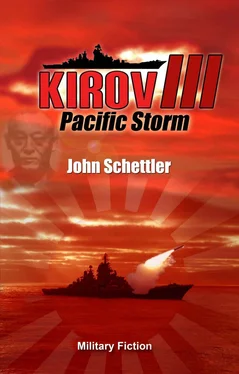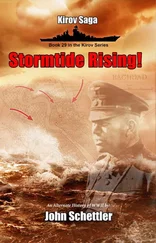“I’m sorry, sir.” Fedorov turned to a watch stander and repeated the order. “Signal alert level two—ship wide alarm.”
“Aye, sir.”
The claxon was now clearly audible, and Volsky nodded his head, satisfied. “Now,” he said. “You have an opinion on our course?”
“If we assume the worst, that we are again settling into another time, and supposing it is still the 1940s, then those planes would either have to be flying from bases at Kupang on Timor Island, or else they are off carriers.”
“Could you get a read on their heading, Rodenko?” The Admiral wanted more information.
“The signal returns were too brief to process, but I did note the range was decreasing, not increasing.”
“That doesn’t sound very reassuring,” said Volsky. “If these were planes from a carrier group, where would they be headed, Mister Fedorov?”
“There were no major naval actions in this region, sir, except perhaps the raid on Darwin in February of 1942.”
“Could this be what we are seeing then?”
“Perhaps, sir. But it would mean we have slipped farther back. Thus far the interval has always seen us move forward in time, never appearing earlier than our first displacement.”
“Yes,” said Volsky, “and I suppose the good Admiral Tovey might have mentioned it if we did appear in February of 1942, and that becomes quite a puzzle if it is the case. We are missing weapons we would not have expended for another six months when we appeared in the Med!”
“I agree, sir,” said Fedorov. “A bit of a paradox when viewed from any perspective other than our own.”
“Then let us pretend Mother Time does not like her skirts ruffled too much, even if she has shown us a little leg. We already have a hand on her knee—our presence in 1941 has clearly caused a great deal of trouble. Perhaps she will not let us go any further with such a thing as you describe—this paradox business.”
“Then I can think of no major carrier action here in 1943, or later. But as I have said, I cannot be sure of anything now. The course of events in the Pacific could all be radically different.”
“There it is again!” said Rodenko. “Much closer now! It looks like 150 kilometers and closing. Something coming out of a nice fat thunderstorm about fifty klicks behind it. …now it’s gone again, sir.”
The Admiral looked at Fedorov. “You are thinking a turn west would bring us into contact with a hostile carrier task force?”
“I can think of nothing else, sir.”
“Very well. Let us turn north for a time and see if we can get more information. But something tells me no matter which direction we head now, we are likely to find trouble. Helm come about to course zero, zero, zero. Speed twenty.”
“The most dangerous thing in the world is an Admiral or a General with a map and a compass.”
~ Murphy’s Law of Combat #63b
Yamashitaset his teacup firmly on the table, savoring the nutty flavor with some satisfaction, and looked at Nagano with a glint in his eye. “It can be done,” he said with an air of calm assurance. “In light of our successful landing at Port Moresby, it is the logical next step.”
“You are aware that the army opposes any further consideration of operations on the Australian mainland.”
“Of course I am, but that is of no concern. They fret and chafe because they have ninety percent of the infantry in China now, and more to deal with than they expected. The fools. What has the invasion of China brought us but an unending war of occupation with 700 million Chinese, neh? Where are the resources this brings home to Japan?”
“Agreed, but the army will use this very same argument against the Australian operation. They claim that it will take at least ten divisions to control Australia, and they will not provide even a fraction of that willingly.”
“You and I both know that is ridiculous,” said Yamashita dismissively. “I took all of Malaya with just a single division—30,000 men against four times our number, and yet we prevailed. At this moment I have enough resources in 25th Army to carry out this operation alone. First off, the notion that we must occupy and control the whole of the Australian mainland is fallacious. It will do us no more good than the war in China. But what the army must realize is this—the resources and oil we have secured thus far in our drive south must be defended if they are ever to be of benefit. And to defend them we must build a strong outer line. The southwest perimeter now stretches from Singapore, through Batavia, Surabaya and Kupang, and its proper anchor is Darwin, not Kupang on Timor. By occupying Darwin our line cuts across the Timor Sea and is securely anchored on the Australian mainland. And Darwin is all we will need for the moment. From there our bombers can range on most other settlements of any consequence in the north.”
Osami Nagano sighed, his hand running over the back of his bald head as he considered. Chief of the Imperial Japanese Naval General Staff, his support would be essential if Yamashita was to have even the slightest chance of gaining approval for his operation. “I understand your logic, but the Army will say that bases on Timor will be sufficient.”
“Perhaps,” said Yamashita, “but leaving Darwin in enemy hands will tempt them to strongly occupy that place as their sole bastion in the north capable or projecting power into the Timor and Arafura Seas, and the Dutch East Indies…or even a return to New Guinea. B-17 bombers are already striking our establishment at Port Moresby—and this from airfields at Cairns and Cooktown on the other side of the Coral Sea! If the Americans put those planes at Darwin, and can protect them with fighters, then they will be able to bomb all the key oil and resource centers in Indonesia—perhaps even Jakarta, and these were our primary reason for driving south in the first place. A child can see this, and the Army must realize it as well.”
Nagano nodded, his eyes searching, considering. “How many divisions,” he then asked bluntly. “What will it take?”
“A single division, and I have that in hand now. With that I can secure Darwin, and then raid or occupy most of the minor ports on the northern coast as well. Of course, if the Army can spare me one further division, I can do much more.”
“And if the enemy sends reinforcements from the south?”
“Let them try. The roads are abysmal, bare tracks that are all but impassable for half the year. The whole area is wilderness. The distance from Darwin to Stanley is greater than that from London to Moscow! Their supply lines will have to stretch over some of the most barren and inhospitable terrain in the hemisphere. This is why we do not need to operate further south. If I push as far south as Katherine that will be more than enough to provide a trip wire defense should the enemy plan such a reinforcement. If they do so, our planes at Darwin will pound them to dust as they march north, and they will have no bases close enough to provide adequate air cover for their operations. For our part, if the navy cooperates, we can easily keep Darwin supplied by controlling the Timor Sea. With strong bases at both Darwin and Kupang, that will not be difficult.”
“Where will you land?”
“A direct assault is feasible, but I will also land troops to the Southwest near the Daly River or perhaps further east. We can launch this operation from Kupang and Amboina now. Give me that second division, and we can strike from Rabaul and Port Moresby and I will take Cooktown, Cairns, possibly even Townsville and secure the Coral Sea.”
“You are aware that Admiral Yamamoto is not in favor of this plan?”
Читать дальше












